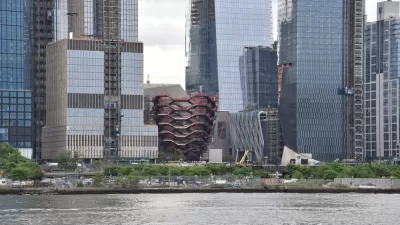Undergirding the massive mix of uses and investments called Hudson Yards is an ambitious plan to gather and analyze data provided by the 65,000 people a day who make use of the facility.
The "mini city" of Hudson Yards, currently under construction on the West Side of Manhattan, is the largest private real estate development in the United States. But the project is remarkable for another reason: "When all stages are completed, the 65,000 people daily who pass through the Hudson Yards’ office towers, residences, shops, restaurants, hotel, public school, and public open space will contribute to a massive stream of data intended to help answer the big questions about how cities of the future should be managed," writes Jessica Leber.
According to Leber, "NYU is collaborating with the two developers of Hudson Yards--the Related Companies and Oxford Properties Group--to create a “data-rich research environment” that will feed information about everything from air quality to how many steps residents take each day."
The concept of "smart cities" is an ongoing question for policymakers and planners, but Leber describes the Hudson Yards project as an unprecedented research laboratory: "The flow of data will help [urban scientists, designers, and engineers] ask questions that were hard to answer before. Some are specific, such as how to manage the trash, recycling, and composting system or other onsite sustainable features like the cogeneration plant. Others are on a more theoretical urban design scale…”
FULL STORY: Beyond The Quantified Self: The World’s Largest Quantified Community

Planetizen Federal Action Tracker
A weekly monitor of how Trump’s orders and actions are impacting planners and planning in America.

Map: Where Senate Republicans Want to Sell Your Public Lands
For public land advocates, the Senate Republicans’ proposal to sell millions of acres of public land in the West is “the biggest fight of their careers.”

Restaurant Patios Were a Pandemic Win — Why Were They so Hard to Keep?
Social distancing requirements and changes in travel patterns prompted cities to pilot new uses for street and sidewalk space. Then it got complicated.

Platform Pilsner: Vancouver Transit Agency Releases... a Beer?
TransLink will receive a portion of every sale of the four-pack.

Toronto Weighs Cheaper Transit, Parking Hikes for Major Events
Special event rates would take effect during large festivals, sports games and concerts to ‘discourage driving, manage congestion and free up space for transit.”

Berlin to Consider Car-Free Zone Larger Than Manhattan
The area bound by the 22-mile Ringbahn would still allow 12 uses of a private automobile per year per person, and several other exemptions.
Urban Design for Planners 1: Software Tools
This six-course series explores essential urban design concepts using open source software and equips planners with the tools they need to participate fully in the urban design process.
Planning for Universal Design
Learn the tools for implementing Universal Design in planning regulations.
Heyer Gruel & Associates PA
JM Goldson LLC
Custer County Colorado
City of Camden Redevelopment Agency
City of Astoria
Transportation Research & Education Center (TREC) at Portland State University
Camden Redevelopment Agency
City of Claremont
Municipality of Princeton (NJ)



























